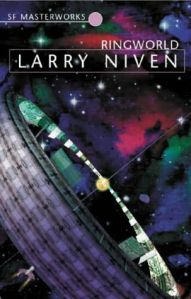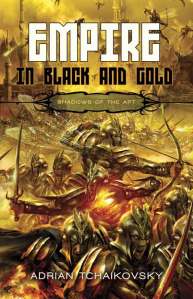I'll give this to SyFy. They produce a lot of schlock but they also have guts! One result is a ratio of good (and sometimes great) stuff compared to fails that is way above Sturgeon's law.
But our field has also suffered blows, of late. Awful news: the plight and fight of my colleague, the brilliant science fiction author Iain Banks against cancer. This, piled onto the similar battle of Jay Lake, reminds me of how I felt when we lost -- so prematurely -- Charles Sheffield… and Octavia Butler and Robert Forward and others who have passed beyond our view in this strange, transitional age, when possibilities can seem so bright but the grinding fate of our cave ancestors still rules our path.
== Sci fi miscellany ==
Book People - Austin's best book store - tallied their top ten list for this year's Hugos. Ah well. Late, but flattering. Thanks! "In his usual fashion David Brin has written an understated masterpiece that is a truly amazing complex piece of literature. Brin is a fantastic writer who has gone back to the well and delivered an absolute gem..." Ah well, it is a year crowded with wonders! Nominees for the 2013 Hugo Award for best in science fiction include novels by John Scalzi, Kim Stanley Robinson, Mira Grant, Lois McMaster Bujold and Saladin Ahmed -- to be awarded at the World Science Fiction Convention in San Antonio in August.
Back to indie media… "New" looks like it could be a terrific short sci fi film with tons of heart. Indie screenwriter and producer John Harden is trying to finance it kickstarter style and has created a really sweet intro-preview-pitch you may enjoy. This is the path that may take us to a realm of bold new (even sometimes optimistic) stories that aren't tired rehashes.
A terrific retrospective review of John Brunner's Stand on Zanzibar (1969) re-introduces that epochal and stunning science fiction novel to new clades of younger sf readers. Without question, it is one of the great literary achievements of our field and possibly of any and all genres. I deliberately modeled both EARTH and EXISTENCE after Brunner's masterpiece, emulating his vividly broad-canvas approach and his ethos, while avoiding a few small mistakes… (and inventing my own, I am sure.) Lately, similar credit was acknowledged by Kim Stanley Robinson. If you haven't read Stand on Zanzibar, do so. Put aside any other recreational reading. You will thank me.
The conspiracy theory behind the destruction of the Death Star. Was it an inside job? Watch a hilarious (and incredibly on-target) satire of conspiracy theory videos in general… that also skewers the childish illogic of the Lucas universe, with its chain of self-indulgent coincidences. Of course, every point in the video is lifted from one of my riffs in STAR WARS ON TRIAL. (Which is even more on-target and funny, Brin assures you, with a perfectly straight face.)
Confused by the state of publishing, with the last major national bookstore chain in decline and e-books rapidly taking over? Have a look at a fascinating article about our new world by the bright young SF author (and my sometime collaborator) Jeff Carlson. Insights galore.
Another bright young SF writer, Adrian Tchaikovsky has a series of quasi-fantasy novels set in a world containing a huge diversity of societies, both insect and human. His essay about this diversity of social experiments (on the Tor site) is fascinating. He also addresses the perennial question: why do so many fantasy tales obsess on inherited oligarchy and kingdoms as a model of governance, which history shows to have been an extremely dumb and unsuccessful pattern, ruining freedom and hopes for most of our ancestors, most of the time. Till we wised up. Very interesting. Give Adrian a try!
Then ponder news about Chinese Science Fiction: The Political Schism between Chinese Science Fiction and Fantasy. It's important, get used to it. Especially, get ready for the debut, next year, of "The Three Body Problem," a huge science fiction hit in China, by the towering new talent over there, Liu Cixin. I am reading the English translation by our own Ken Liu and enjoying it immensely. No... I mean seriously-immensely. I consider Liu Cixin to be much more than the top science fiction author in China. When you read him, you'll agree he's one of the best in the world.
Meanwhile, is SF finally getting respect in its heartland? Astonishing. this is the second time in a year that Atlantic has published an essay that is at least somewhat favorably inclined toward science fiction. For decades they ran a vendetta against SF, commissioning execrable hit pieces like clockwork. But this article about the great stylist Cordwainer Smith -- one of my favorite short story writers -- is insightful and should lead many curious minds to our field.
An added note: Smith (aka Paul Linebarger) was among those who - along with Pierre Boulle and H.G. Wells) pioneered tales about what I have called the "uplift" of higher animals, bestowing upon them the mixed-promethean-mephistofelian gifts of speech and logical thought. My main innovation was not to portray humanity doing this stupidly and cruelly. But I stand on giant shoulders.
== And more sci fi miscellany ==
Language derivation, the tracing of linguistic roots, has finally entered the 21st Century. Computer program finds root words of modern languages.
According to newflashes popping up around the web, the Washington Academy of Sciences has created a seal of approval for the scientific accuracy of novels. Alas, as my colleague - the sharp Nancy Fulda - points out, there is less here than meets the eye. Kinda disappointing execution of what I (naturally) took to be a very good idea.
Despite being harried by fans of the Most Interesting Man in the World -- (Hey guys, I am the BALD interesting guy) -- I really love that ad campaign. Now it turns out that the actor who plays the MIMITW - Jonathan Goldsmith - played a red shirt in the original Star Trek series… and lived! You can imagine the lines. Or read them on iO9. My favorite? The Borg want to be assimilated by HIM.
The 1950s radio dramatization of BRAVE NEW WORLD, introduced by Aldous Huxley, is available online.
The High Frontier, Human Colonies in Space, by Gerald K. O'Neill, now free on Kindle.
Choose your next author based on the genre and how he or she looks? I wish they chose a better picture of me! The URL seems to say Find...MEAN... author!
How to porpoise like a dolphin... Water-jet booties that solve all the jet-pack problems. What a great idea... and like the best - obvious in retrospect.
Eric S. Raymond is a personality of some note in the hacker community. His essay on the political movements in science fiction -- while incomplete and two-dimensional - nevertheless is well-balanced and thoughtful. I went "huh!" a couple of times.
Finally, Bruce Sterling talks a lot about how new media and methods kill older ones: e.g. the death of both bookstores and the personal computer, and he makes some interesting metaphor-parallels with the cliff dwellers in the eleventh century American southwest. He does this sort of thing very well and I'm glad he is in the world. I agree with most of it and find the rest interesting, and can shrug aside the preening. In the end, however, after a very long Chautauqua meal, I think back upon what I had read and ask: what do I know now that I did not know before reading Bruce's speech? That Sergey Brin is brilliant and useful?
I knew that already.
==Looking to the Future==
Want to spent a few days contemplating the our future in space? Attend the StarShip Century Symposium May 21 and 22 at UCSD. Speakers include Gregory Benford, Neal Stephenson, Freeman Dyson, Vernor Vinge, David Brin, Geoffrey Landis, Allen Steele, Paul Davies, John Cramer, Jill Tarter, Robert Zubrin, Joe Haldeman, and others, as part of the opening ceremonies for the new Arthur C. Clarke Center for Human Imagination. Be sure to register to attend.
The ideas of a 100 year program to create a starship will be explored – from the development of an interplanetary economic infrastructure, to the structural requirements, the human factors and speculations on what we might find.
Come, contribute...and find inspiration!



